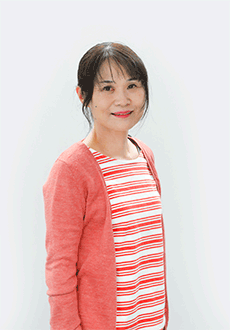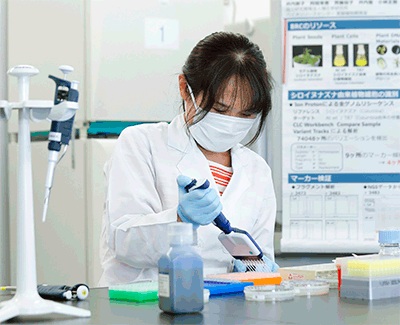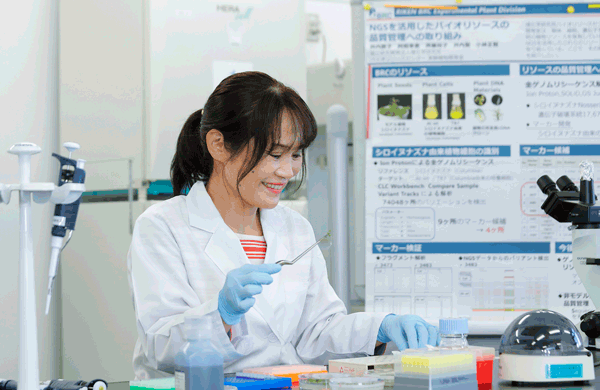I returned to work while my child was still small, but my little questions during those frenzied days led to results in my research (Atsuko Iuchi, Technical Staff II)

Many women active in a variety of fields work at RIKEN BRC. We interviewed 12 of these women for their insights on how they continue to flourish with work styles that fit their particular lifestyles.
In this interview, we spoke with Atsuko Iuchi, who works as Technical Staff in the Experimental Plant Division.
She returned to work when her child was still young, and is now past this particularly busy time of life. Iuchi continues to humbly work on her research, without forgetting her appreciation for those around her. She spoke to us about her thoughts on work, motivation, and hopes for the future, among other topics.
Profile
- Atsuko Iuchi
- Technical Staff II, Experimental Plant Division
- Iuchi participated in projects as a temporary employee from 2003, and became involved with quality management for bioresources and joint research at the BioResource Center shortly after it was established. In 2010, she became a member of the Technical Staff, and is currently in charge of quality management and technology development for plant bioresources, as well as plant microbe symbiosis research.
After having my child, I worked at RIKEN as a temporary employee, and was able to balance work and childcare thanks to the support of my team.
I began working at RIKEN in 2003. Previously, I had worked at another research institute, but I left when I moved. I stopped working for a while to raise my child, but when we got a place at a daycare when my child was 1 year old, I decided to return to work as a temporary employee. That said, I was nervous about going to work at first after I’d had a child, and really struggled with the idea of letting someone else take care of my young child while I worked.
But at the time, the lab director himself was deeply involved in childcare, and the entire team was very understanding about raising children, so I was able to work with peace of mind. I had the support and encouragement of everyone around me, so I was able to get through the difficult stage of childrearing.
Also, being able to get back out into the world and take on a role other than mother was very refreshing. Both work and childcare have their own unique joys, frustrations, and feelings of accomplishment. Raising my child raises my motivation at work, and work makes me more motivated to be a good mother, so even when I was at my busiest, my days were very satisfying.
I was able to build my career without too many gaps, so ultimately, I think it was good that I went back to work early. Now, RIKEN has more programs to help working parents, so I think that people who plan on having children in the future and people who are raising children right now can find a work style that suits them.
I was able to take a more positive mindset through my research.

The work that I am currently in charge of has a method called genotyping analysis. This is a method we use to examine which gene regions are involved in determining the individual differences of living organisms, such as strong resistance to desiccation, strong resistance to disease, and tall height. Finding the right answer among an endless array of possibilities requires persistence, but this is a type of analysis that I’m good at.
Before I start research, I come up with a hypothesis, but even now that I’ve built up experience, it’s rare for my hypotheses to be correct. So when I am right, I’m so excited that I punch the air in triumph. This really makes me feel like it’s all worthwhile.
But sometimes I finish up research without understanding why the results turned out the way they did. If I continue on with my research, I sometimes understand the reason five or ten years later. This is what makes research interesting, and very deep. No one knows when or where the research we are doing will be useful, so it is important to keep our antenna up at all times.
This has affected the way I think. For example, when something difficult happens or I make a mistake, I look at it in a positive light, like something I needed so that I could move forward. Just like my research, I want to always be moving forward without letting mistakes stop me so that I look back later and realize that it had meaning, just like with my research.
Refining my senses as a researcher without overlooking everyday questions.
Sometimes I get stuck when carrying out research. But if I think too much, I don’t get any good ideas, so I purposely avoid thinking about work on Saturdays and Sundays. When I still can’t get work out of my mind, I force myself to reset by running. When I’m running, the pain of running overtakes everything else and I am naturally unable to think. So in the end, both my mind and body are refreshed and I can go back to my work at the start of the week with a new outlook.
I also always try to be appreciative of the people around me. I’ve been able to continue my research at RIKEN for this long because of the ties between people and our connections. I think it’s important to stop ourselves from taking our current environment and situation for granted, and never forget to feel grateful in all situations.
Another thing that is very important in continuing this work is to always take your everyday doubts seriously. It can be a simple question, just like you would wonder how you could make something taste better when you’re cooking. Curiosity is crucial in the research profession, and I think that people who have questions about all kinds of things are really suited to this job. I recommend that people who want to work in research refine these senses.
